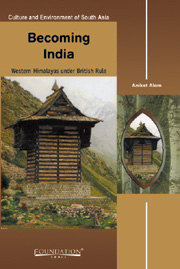Book contents
- Frontmatter
- Contents
- Preface
- Glossary
- Map
- Chapter 1 The Geography of the Western Himalayas
- Chapter 2 Political Economy of the Western Himalayas: Early Nineteenth Century
- Chapter 3 The Foundations of British Rule: Hill State, Hill Station, Land Settlement and Monetisation
- Chapter 4 Peasant Rebellions and Royal Reconciliation: British Rule inside the Hill States
- Chapter 5 Social Movements during British Rule
- Chapter 6 After Independence
- Conclusion
- Bibliography
- Index
Chapter 4 - Peasant Rebellions and Royal Reconciliation: British Rule inside the Hill States
Published online by Cambridge University Press: 26 October 2011
- Frontmatter
- Contents
- Preface
- Glossary
- Map
- Chapter 1 The Geography of the Western Himalayas
- Chapter 2 Political Economy of the Western Himalayas: Early Nineteenth Century
- Chapter 3 The Foundations of British Rule: Hill State, Hill Station, Land Settlement and Monetisation
- Chapter 4 Peasant Rebellions and Royal Reconciliation: British Rule inside the Hill States
- Chapter 5 Social Movements during British Rule
- Chapter 6 After Independence
- Conclusion
- Bibliography
- Index
Summary
The emergence of a land market in the region of the Simla Hill States during the last years of the nineteenth century, and the consequent stratification within the egalitarian clans of the Khash-Kanet, became causes for social disturbances even though they remained marginal to the economics of the peasant farm. Substantial details have been given in the hope that the flavour of social changes and the peasantry's response to these would emerge. It would become quite evident that the emergence of stratification within the peasant clans of the Khash-Kanet became a contributory cause of unrest as the effects of British rule became more obvious. The Hill States became conduits for the transmission of British policy in the Western Himalayas. On the other hand, the British remained largely unaware of the receptivity of the people to their policies since the channels for communicating this were hindered by the formal independence of the Hill States. It is, therefore, common to find that the normality of the Hill States' existence was repeatedly questioned by the eruption of frequent rebellions. It is interesting to note that there were hardly any rebellions in areas like Kullu and Kangra, which were directly administered by the British. While the Hill States buffered British rule in the region, they simultaneously helped to bring to the fore the more glaring of the contradictions contained within it and eventually became the weakest links of colonialism in the Western Himalayas.
- Type
- Chapter
- Information
- Becoming IndiaWestern Himalayas under British Rule, pp. 147 - 207Publisher: Foundation BooksPrint publication year: 2007

